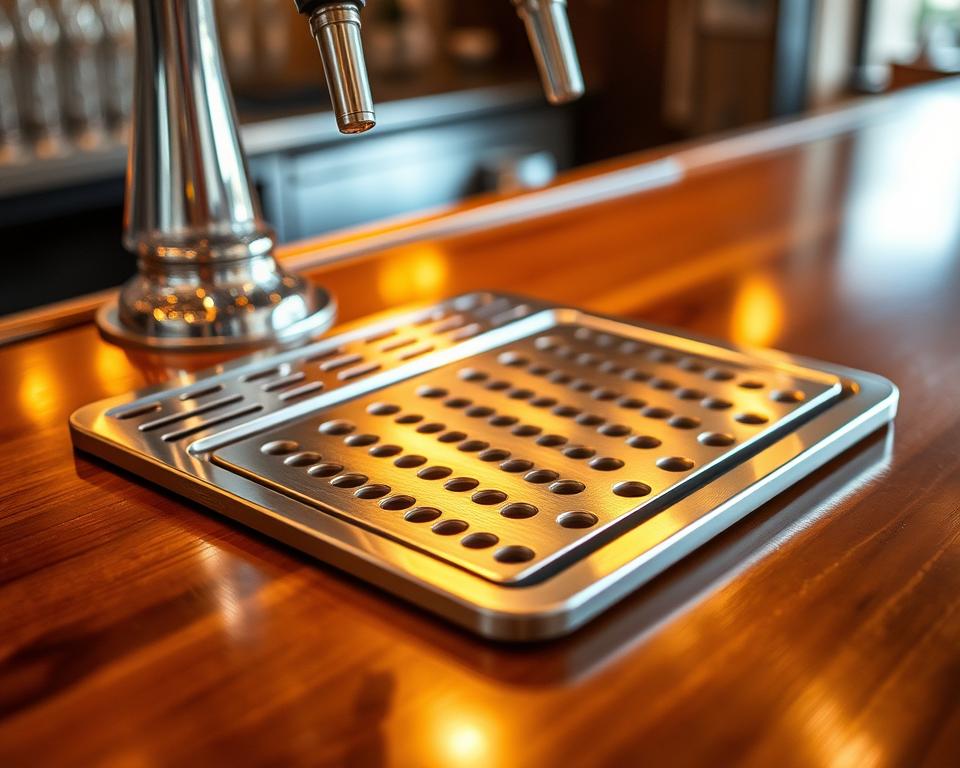Professional Grease Trap Pumping Assistance – Clean & Effective
Foodservice operations produce over a gallon of lipids, oils, and fat, oil, and grease (FOG) daily. This highlights the critical need for efficient grease cleaning company. Without proper maintenance, these substances can block pipes, disrupt functions, and pose health hazards. By partnering with a trusted service like All In Sanitation Services, businesses can guarantee proper waste disposal and adhere to health standards.
Routine fats oils and grease management enhances sanitation and health. It also safeguards the establishment’s reputation. Skilled professionals use advanced equipment to maintain fat interceptors. This guarantees kitchens run smoothly and avoids costly downtime due to grease issues.
Significance of Fat Interceptor Upkeep for Foodservice Operations
Proper upkeep of grease traps is crucial in commercial kitchens. It greatly helps in the effective handling of fats, lubricants, and grease (FOG). These interceptors act as a primary barrier, capturing fats, oils, and grease before it reaches the wastewater network. Regular maintenance reduces the chance of foul odors, clogs, and pest infestations, which can interrupt functions and cause unsanitary environments.
Understanding the Function of Fat Interceptors
Grease traps are vital in collecting unwanted substances during foodservice fat management. They operate on gravity-based mechanics, permitting lighter fats and lubricants to float to the top and denser solids to deposit at the bottom. This method ensures healthier plumbing systems and assists companies meet local rules. Without proper care, grease traps can lead to severe plumbing issues, resulting in expensive fixes and non-operation periods.
Health and Safety Considerations
Ignoring grease trap upkeep can lead to serious health hazards. A blocked or malfunctioning interceptor may cause fat overflow or backflow, creating unsanitary conditions and drawing in pests. Eateries and hospitals must focus on fat handling to ensure a safe setting for employees and clients. A regular upkeep plan through industrial pipe services is crucial for maintaining fat interceptors efficient and compliant with health rules.
Grease Trap Pumping Assistance: What You Need to Understand
Comprehending the importance of grease trap evacuation assistance is crucial for a commercial kitchen’s performance. Regular maintenance avoids clogs and ensures fat handling networks function well. With expert assistance, businesses get several important benefits.
Benefits of Expert Evacuation Assistance
Involving in a professional fat interceptor pumping service offers numerous benefits:
- Complete cleaning that minimizes the chance of clogs and network overflows.
- Extended lifespan of culinary equipment and disposal systems.
- Use of correct techniques for complete removal of fat, preventing problems associated with backflow of treated liquid back into the interceptor.
- Knowledge from skilled technicians specialized in fat handling sanitation.
Frequency of Evacuation Services
The interval of fat interceptor pumping depends on several factors:
- The size of the grease trap in operation.
- The volume of grease generated from culinary activities.
- Regional rules concerning foodservice operation fat handling.
Businesses should seek advice from experts to determine a upkeep plan that meets their unique requirements. Routine septic tank pumping and fat handling sanitation safeguard culinary operations and enhance hygiene activities.
Advanced Methods in Fat Interceptor Sanitation
Progress in equipment have revolutionized fat interceptor sanitation, making assistance more effective and thorough. Contemporary equipment plays a vital function in maintaining the cleanliness of these crucial parts in commercial kitchens. By leveraging cutting-edge solutions, drain cleaning services can now perform thorough inspections and maintain grease traps with exceptional precision.
Contemporary Tools and Technology Employed
Today’s grease trap cleaning relies on advanced tools for deeper cleaning and more effective grease and waste extraction. These innovations entail:
- High-pressure water jetting tools for complete cleaning.
- Camera inspections to detect clogs and evaluate interceptor status.
- Mechanized pumping systems that enhance performance.
These technologies not only reduce downtime but also ensure fat interceptors function efficiently, reducing the risk of blockages and costly fixes.
Environmental Responsibility
Many service providers focus on sustainable fat handling methods. By adopting sustainable sanitation answers, they assist minimize the ecological footprint of grease disposal. These responsible methods result in:
- Reduced chemical usage.
- Proper management of fat in compliance with local regulations.
- Support of a cleaner community and healthier ecosystems.
Commitment to environmental responsibility in grease trap upkeep helps commercial kitchens in several manners. It enhances adherence, improves community health, and supports overall long-term viability.
As a Final Point
Grease trap pumping assistance is vital for foodservice operations to operate effectively and upkeep hygiene. It ensures compliance with ecological regulations and safeguards the health of employees and clients. Regular maintenance and expert solutions are key to this.
Companies should choose professional services like those from All In Sanitation Services. These assistance keep grease traps sanitary, efficient, and eco-friendly. Proper grease management saves money, prolongs equipment life, and improves culinary functions.
Investing in grease trap pumping services is prudent for commercial kitchens seeking optimal efficiency and cleanliness. Routine upkeep establishes a healthier workplace and supports long-term food service practices.
Job-10
Eatery Fat Interceptor Assistance: Preserve The Kitchen Sanitary
Did you know that nearly 80% of sewer backups in cities stem from fats, grease, and fat (fats, oils, and grease)? This concerning statistic highlights the vital significance of proper local grease traps cleaning service. In the busy world of professional kitchens, a grease trap is essential for refuse handling. It divides FOG from wastewater, preventing sewer blockages and ensuring a healthier, healthier setting.
Regular emptying and upkeep of grease traps are vital to hygiene and effectiveness. Eateries that select specialist fat interceptor maintenance not only conform to local laws but also escape foul odors and expensive interruptions. By partnering with professionals like All In Sanitation Services, you can establish maintenance plans that match your dining establishment’s unique requirements, guaranteeing uninterrupted day-to-day functioning.
The Necessity of Eatery Fat Collector Cleaning
Upkeeping a grease trap service is essential for a dining establishment’s smooth and hygienic cooking area. These devices collect fats, grease, and fat (fats, oils, and grease) before they reach the sewer system. Consistent maintenance ensures cooking areas function smoothly and adhere to hygiene regulations.
Comprehending Fat Interceptors
Fat collectors trap and isolate FOG from sewage. This stops blockages and spillages, maintaining cooking areas operating efficiently. Consistent upkeep extends their durability and secures your restaurant complies with codes.
Implications of Overlooking Oil Collector Servicing
Overlooking grease trap maintenance results in severe issues. These comprise:
- Blockages in the sewer infrastructure
- Foul smells impacting the customer atmosphere
- Possible sanitation hazards due to breach with hygiene standards
Such problems disrupt routine activities and can damage a restaurant’s image.
Following Rules
Adhering to eatery fat disposal laws is essential. Municipal regulations dictate how fat collectors must be maintained and cleared. Breach can lead to substantial fees, affecting a restaurant’s budget. Collaborating with a professional oil interceptor maintenance guarantees adherence and maintains operations effective.
Benefits of Professional Grease Trap Cleaning
Hiring a grease trap cleaning company for frequent maintenance yields substantial merits for restaurants. It boosts cleanliness, enhances effectiveness, and secures security in the kitchen environment.
Preventative Maintenance
Specialist grease trap pumping is crucial for preventative maintenance. It spots and addresses challenges in advance, avoiding unanticipated malfunctions. This proactive approach guarantees the fat collector functions properly, reducing the risk of blockages and backups.
Smooth Culinary Activities
Planning consistent servicing during off-hours guarantees uninterrupted functioning in the cooking area. This strategy facilitates smooth processes, allowing employees to dedicate themselves to offering high-quality service. A sanitary grease trap results in a more efficient culinary space by stopping unpleasant scents and unsightly blockages.
Professional Checkups and Corrections
Consistent assessments by trained professionals secure all grease trap parts work correctly. Firms focused on oil interceptor maintenance provide professional fixes when needed, sparing dining establishments from pricey emergencies. This level of care maintains health standards and culinary space protection, creating a more secure work environment for staff.
Conclusion
Eatery fat collector cleaning is vital for a sanitary, effective cooking area. Regular servicing and expert cleaning lower the risk of pricey sewer challenges and health hazards. This method assists secure facilities and images.
Ignoring oil interceptor maintenance can lead to legal challenges with local regulations, causing fees or delays. Adhering to maintenance schedules guarantees restaurants comply with health inspectors’ standards, stopping interruptions to their operations.
Working with a trusted company like All In Sanitation Services streamlines fat collector servicing. Their specialist solutions keep cooking areas running well and secure hygienic, healthy eating spaces, improving patron approval.



